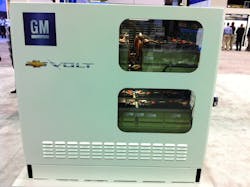Generating Power from Old Automotive Batteries
Automation industry shows are rarely lacking in cool, new technologies to showcase. And while several intriguing new products were on display in Orlando, Fla., at ABB’s Automation & Power World 2013, one of the displays I found most interesting was at the ABB Energy Storage Module (ESM) booth.
ESM was presenting a community energy storage (CES) system comprised of two enclosures that separately house the ABB ESI-S inverter and five GM Chevy Volt batteries. The batteries, which have been in use in the Volt for 8 to 10 years, are capable of holding only 70 percent of their full charge, thereby making them less viable for automotive use. But that remaining capacity, which can discharge power over the span of several hours, has definite benefits as a stationary storage application.
ABB’s ESI-S inverter is designed to communicate with the utility and controls the performance of the overall CES system. The batteries reportedly charge and discharge based on autonomous commands from the inverter.
The Volt battery powered CES technology is currently in the “proving stages,” says Alexandra Goodson, ABB’s ESM business development manager. She says that Duke Energy has purchased one in order to test its capabilities for delivering power to the grid. Designed to deliver up to 25 kVA into the grid, the CES has a total energy capacity of 50 kWh.
Asked to describe some of the expected applications of this CES, Goodson said that strip malls and small industrial facilities could use it to offset peak utility charges. She also pointed out that utilities could use it to offset spikes driven by extra electric vehicle (EV) charging, which is expected to increase as more EVs are sold.
Primary industrial applications for the CES include: peak shaving, load shifting, voltage regulation, renewable integration and back-up power.
ABB lists ESM benefits as: the ability to improve load factor, lower power charges and cost of energy, allow participation in capacity markets as a dispatchable resource, helping control the amount of reactive power flowing through the grid, enabling fast DC charging without increasing demand charges; and supporting residential and commercial loads during power outages.
Goodson noted that ABB is also working with Nissan on a similar application with used Nissan Leaf batteries.

